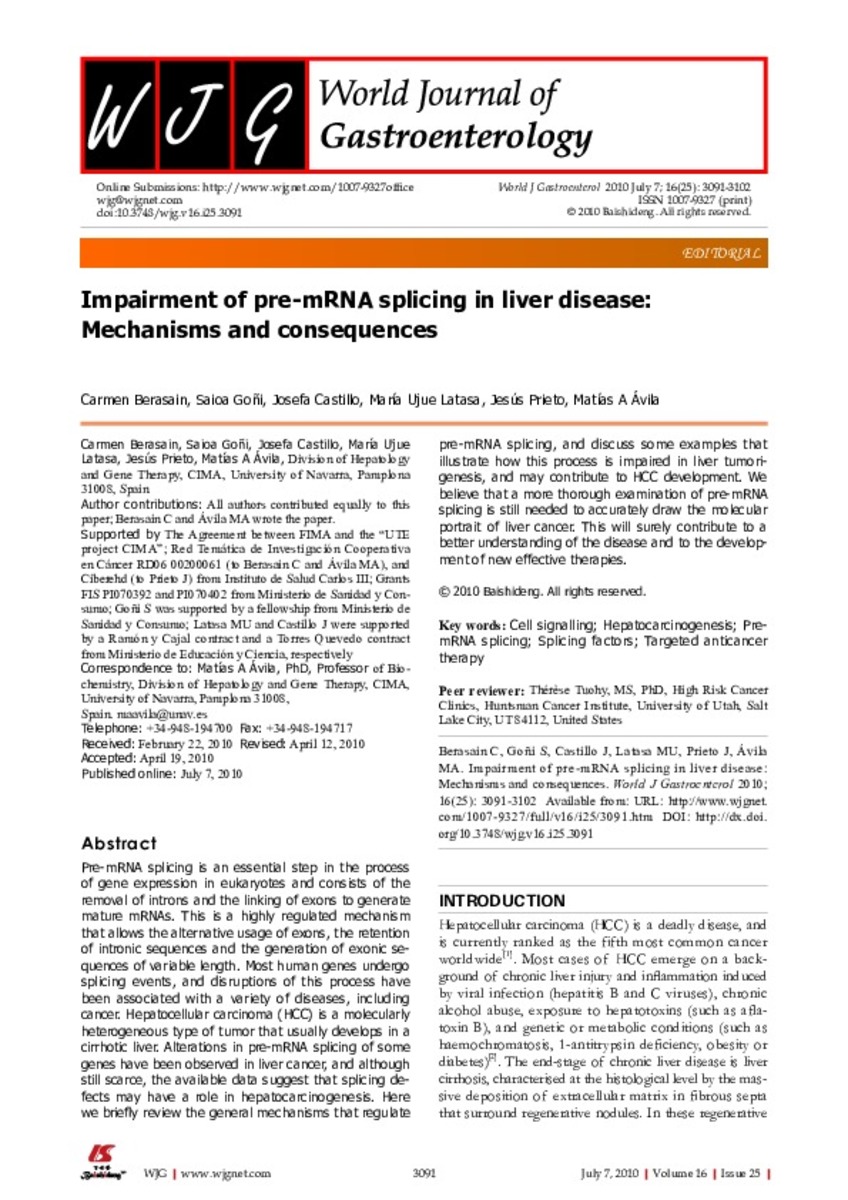Registro completo de metadatos
| Campo DC | Valor | Lengua/Idioma |
|---|---|---|
| dc.creator | Berasain, C. (Carmen) | - |
| dc.creator | Goñi, S. (Saioa) | - |
| dc.creator | Castillo, J. (Josefa) | - |
| dc.creator | Latasa, M.U. (María Ujué) | - |
| dc.creator | Prieto, J. (Jesús) | - |
| dc.creator | Avila, M.A. (Matías Antonio) | - |
| dc.date.accessioned | 2019-06-11T11:51:57Z | - |
| dc.date.available | 2019-06-11T11:51:57Z | - |
| dc.date.issued | 2010 | - |
| dc.identifier.citation | Berasain, C. (Carmen); Goñi, S. (Saioa); Castillo, J. (Josefa); et al. "Impairment of pre-mRNA splicing in liver disease: mechanisms and consequences". World Journal of Gastroenterology. 16 (25), 2010, 3091 - 3102 | es_ES |
| dc.identifier.issn | 1007-9327 | - |
| dc.identifier.uri | https://hdl.handle.net/10171/57783 | - |
| dc.description.abstract | Pre-mRNA splicing is an essential step in the process of gene expression in eukaryotes and consists of the removal of introns and the linking of exons to generate mature mRNAs. This is a highly regulated mechanism that allows the alternative usage of exons, the retention of intronic sequences and the generation of exonic se- quences of variable length. Most human genes undergo splicing events, and disruptions of this process have been associated with a variety of diseases, including cancer. Hepatocellular carcinoma (HCC) is a molecularly heterogeneous type of tumor that usually develops in a cirrhotic liver. Alterations in pre-mRNA splicing of some genes have been observed in liver cancer, and although still scarce, the available data suggest that splicing de- fects may have a role in hepatocarcinogenesis. Here we briefly review the general mechanisms that regulate pre-mRNA splicing, and discuss some examples that illustrate how this process is impaired in liver tumori- genesis, and may contribute to HCC development. We believe that a more thorough examination of pre-mRNA splicing is still needed to accurately draw the molecular portrait of liver cancer. This will surely contribute to a better understanding of the disease and to the develop- ment of new effective therapies. | es_ES |
| dc.description.sponsorship | Supported by The Agreement between FIMA and the “UTE project CIMA”; Red Temática de Investigación Cooperativa en Cáncer RD06 00200061 (to Berasain C and Ávila MA), and Ciberehd (to Prieto J) from Instituto de Salud Carlos III; Grants FIS PI070392 and PI070402 from Ministerio de Sanidad y Con- sumo; Goñi S was supported by a fellowship from Ministerio de Sanidad y Consumo; Latasa MU and Castillo J were supported by a Ramón y Cajal contract and a Torres Quevedo contract from Ministerio de Educación y Ciencia, respectively | es_ES |
| dc.language.iso | eng | es_ES |
| dc.publisher | Baishideng Publishing Group | es_ES |
| dc.rights | info:eu-repo/semantics/openAccess | es_ES |
| dc.subject | Cell signalling | es_ES |
| dc.subject | Hepatocarcinogenesis | es_ES |
| dc.subject | Pre- mRNA splicing | es_ES |
| dc.subject | Splicing factors | es_ES |
| dc.subject | Targeted anticancer therapy | es_ES |
| dc.title | Impairment of pre-mRNA splicing in liver disease: mechanisms and consequences | es_ES |
| dc.type | info:eu-repo/semantics/article | es_ES |
| dc.identifier.doi | https://doi.org/10.3748/wjg.v16.i25.3091 | es_ES |
| dc.identifier.doi | 10.3748/wjg.v16.i25.3091 | - |
Ficheros en este ítem:
Estadísticas e impacto
Los ítems de Dadun están protegidos por copyright, con todos los derechos reservados, a menos que se indique lo contrario.






